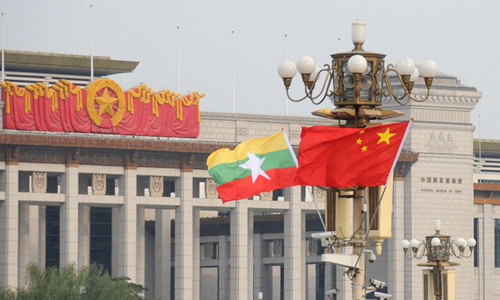HOME >> OPINION,SPECIAL-COVERAGE
China can support Myanmar for win-win benefits
By Aung Tun Source:Global Times Published: 2020/1/15 21:48:40

Photo: VCG
This week Chinese President Xi Jinping will pay a state visit to Myanmar which will be his first in 2020. This is the first Chinese president to visit Myanmar in almost 20 years. Former Chinese president Jiang Zemin paid a state visit in 2001. In the interlude, China became a world power, shaping global investments especially via the Belt and Road Initiative (BRI) in which Myanmar is also an important participant.Sharing a 2,185-kilometer land border, China and Myanmar have been becoming more and more important to work together to gain win-win benefits for both countries. It's expected that President Xi's visit will reinforce that outcome. There are some benefits that China can share with Myanmar.
First, Myanmar's complex transitions. Launched in 2011, Myanmar's transition has undergone a four-fold process: political transition, open economy, peace process including federal building and transforming "isolationism" into "international engagement." In fact, all of these subjects more or less need China's support and good understanding of Myanmar. By supporting Myanmar in this way, China would also benefit. This is simply because Myanmar's overall stability depends on matters which are also important for China.
It's also vital to note that Xi's visit occurs in a very important year in Myanmar's politics as the election is scheduled for late 2020; this would determine Myanmar's next important political decision very soon. Political parties would raise the issue of Myanmar's foreign policy, including that on China, in their election campaigns. Many have already done so. This couldn't be limited to the Chinese projects including the Myitsone Dam, about which Myanmar's public would like to hear more. The Rakhine issue including the recent International Court of Justice case would also be politicized.
Second comes the peace process. Ending a civil war of 70 years in Myanmar is crucial for the country's success. The peace process has continued to be a national priority for the government led by the National League for Democracy since it came to power in 2015. That is important for China because Beijing's economic interests in the country are related to that. For instance, Kyaukpyu port and SEZ in Rakhine state can potentially allow China to access the Indian Ocean. Without peace, such important projects are hard to implement. Along the China-Myanmar border, some ethnic armed organizations are active and perceived to be influential by China. It's crucial for both countries to work on long-lasting peace.
Third is conflict sensitivity. This also relates to China's BRI projects in Myanmar. Huge infrastructure projects like the BRI need to factor in areas of conflict. For instance, China's BRI projects are located in many conflict-affected zones across Myanmar such as Rakhine and Shan provinces. In addition, study suggests that public support for the BRI is contingent on Chinese firms' local partners and social engagement strategies. Both countries should also take a lesson from the controversial Myitsone Dam project at least from the perspective of conflict sensitivity. It's thus obvious that conflict sensitivity considerations are a pre-requisite for all projects and policy-related interventions, as conflict-blind implementation is likely to exacerbate existing social, political and economic tensions, and undermine hard-won gains in a transitional context such as Myanmar.
The fourth issue is ending Myanmar's isolationist status. This is very crucial for the country's success. Political history suggests that when Myanmar ended its isolation, it found itself lagging countries in the region like those in the ASEAN bloc and its neighbors. Myanmar's success also depends on its opening status. The country cannot overcome poverty without international assistance. Therefore, Myanmar needs foreign investment as well as technology to advance its socioeconomic status. For instance, agriculture, which is the backbone of the country's economy, must be strengthened via massive investments in both technology and funds infusion. The international community including China would provide support in such cases.
In fact, China and Myanmar already have the experience of sorting out a border dispute in 1960. The settlement serves as an example for Asian countries to solve border issues. Having said that, we should look forward to Xi's visit bringing long-lasting win-win benefits for both countries. We also look forward to President Xi reinforcing the words by premier Zhou Enlai in this 70th year of diplomatic ties.
The author is an independent researcher working on governance and political economy issues in Myanmar. opinion@globaltimes.com.cn
Posted in: VIEWPOINT,EXCLUSIVE REPORT